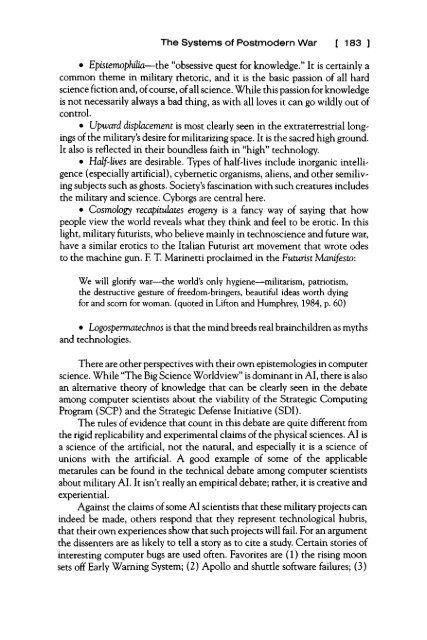9. The Systems of Postmodern War - Chris Hables Gray
9. The Systems of Postmodern War - Chris Hables Gray
9. The Systems of Postmodern War - Chris Hables Gray
You also want an ePaper? Increase the reach of your titles
YUMPU automatically turns print PDFs into web optimized ePapers that Google loves.
<strong>The</strong> <strong>Systems</strong> <strong>of</strong> <strong>Postmodern</strong> <strong>War</strong> [ 183 ]<br />
• Epistemophilia—the "obsessive quest for knowledge." It is certainly a<br />
common theme in military rhetoric, and it is the basic passion <strong>of</strong> all hard<br />
science fiction and, <strong>of</strong> course, <strong>of</strong> all science. While this passion for knowledge<br />
is not necessarily always a bad thing, as with all loves it can go wildly out <strong>of</strong><br />
control.<br />
• Upward displacement is most clearly seen in the extraterrestrial longings<br />
<strong>of</strong> the military's desire for militarizing space. It is the sacred high ground.<br />
It also is reflected in their boundless faith in "high" technology.<br />
• Half-lives are desirable. Types <strong>of</strong> half-lives include inorganic intelligence<br />
(especially artificial), cybernetic organisms, aliens, and other semiliving<br />
subjects such as ghosts. Society's fascination with such creatures includes<br />
the military and science. Cyborgs are central here.<br />
• Cosmology recapitulates erogeny is a fancy way <strong>of</strong> saying that how<br />
people view the world reveals what they think and feel to be erotic. In this<br />
light, military futurists, who believe mainly in technoscience and future war,<br />
have a similar erotics to the Italian Futurist art movement that wrote odes<br />
to the machine gun. F. T. Marinetti proclaimed in the Futurist Manifesto:<br />
We will glorify war—the world's only hygiene—militarism, patriotism,<br />
the destructive gesture <strong>of</strong> freedom-bringers, beautiful ideas worth dying<br />
for and scorn for woman, (quoted in Lifton and Humphrey, 1984, p. 60)<br />
• Logospermatechnos is that the mind breeds real brainchildren as myths<br />
and technologies.<br />
<strong>The</strong>re are other perspectives with their own epistemologies in computer<br />
science. While "<strong>The</strong> Big Science Worldview" is dominant in AI, there is also<br />
an alternative theory <strong>of</strong> knowledge that can be clearly seen in the debate<br />
among computer scientists about the viability <strong>of</strong> the Strategic Computing<br />
Program (SCP) and the Strategic Defense Initiative (SDI).<br />
<strong>The</strong> rules <strong>of</strong> evidence that count in this debate are quite different from<br />
the rigid replicability and experimental claims <strong>of</strong> the physical sciences. AI is<br />
a science <strong>of</strong> the artificial, not the natural, and especially it is a science <strong>of</strong><br />
unions with the artificial. A good example <strong>of</strong> some <strong>of</strong> the applicable<br />
metarules can be found in the technical debate among computer scientists<br />
about military AI. It isn't really an empirical debate; rather, it is creative and<br />
experiential.<br />
Against the claims <strong>of</strong> some AI scientists that these military projects can<br />
indeed be made, others respond that they represent technological hubris,<br />
that their own experiences show that such projects will fail. For an argument<br />
the dissenters are as likely to tell a story as to cite a study. Certain stories <strong>of</strong><br />
interesting computer bugs are used <strong>of</strong>ten. Favorites are (1) the rising moon<br />
sets <strong>of</strong>f Early <strong>War</strong>ning System; (2) Apollo and shuttle s<strong>of</strong>tware failures; (3)








